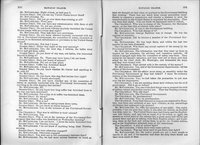990-991
| Previous Page | Next Page |

|
Mr. McCandless. Eight o'clock, or half past 8.
Senator Gray. Did you see any United States troops then?
Mr. McCandless. No.
Senator Gray. Did you go over there that evening at all?
Mr. McCandless. Went past.
Senator Gray. Did you have any communication with them at all?
Mr. McCandless. No, not any person.
Senator Gray. Do you know whether anybody furnished the United States troops with provisions that night?
Mr. McCandless. They had their own provisions.
Senator Gray. Do you know whether anybody connected with the city or Provisional Government, the committee of safety, furnished or caused to be furnished refreshments or provisions to the United States troops?
Mr. McCandless. Not that I know.
Senator Gray. Either that night or the next morning?
Mr. McCandless. Yes; the next day, I believe, the ladies went down and got them coffee.
Senator Gray. Do you know of any man, not ladies, who interested himself in doing it?
Mr. McCandless. No. There may have been; I do not know.
Senator Gray. Have you heard of anyone?
Mr. McCandless. No; not on that point.
Senator Gray. Coffee was furnished them?
Mr. McCandless. I think it was.
Senator Gray. DO you know whether Mr. Carter had anything to do with it?
Mr. McCandless. No.
Senator Gray. Do you know who dug that latrine that night?
Mr. McCandless. I heard afterwards.
Senator Gray. Do you know whether any of the committee of safety or anybody connected with the Provisional Government had anything to do with digging that latrine?
Mr. McCandless. No.
Senator Gray. Do you know how long coffee was furnished them in the way you have described?
Mr. McCandless. For a day or so coffee was furnished them.
Senator Gray. By whom?
Mr. McCandless. Mr. Knowltie.
Senator Gray. Who is he?
Mr. McCandless. He has an eating house down town.
Senator Gray. Do you know at whose instance?
Mr. McCandless. Yes; at the instance of the Provisional Government.
The Chairman. That was in addition to their rations?
Mr. McCandless. Yes.
Senator Gray. Was it not at the instance of the Provisional Government that that coffee was furnished on Wednesday morning?
Mr. McCandless. I do not know. I think the ladies furnished that.
Senator Gray. On Tuesday evening?
Mr. McCandless. I do not know of anything being done Tuesday evening.
Senator Gray. You were otherwise engaged?
Mr. McCandless. Otherwise engaged.
Senator Gray. You were not in the commissary business then?
Mr. McCandless. No; we had more serious business on hand, at
|
least we thought we had when we got back to the Government building that evening. There was not much done except proceeding immediately to organize a commission and charter a steamer to send the commissioners to the United States to negotiate for annexation. That was done that night. I do not think we adjourned until 11 o'clock.
The Chairman. Who was in charge of the Treasury, the Hawaiian money, at the time this revolution took place?
Mr. McCandless. It was in the Government building.
The Chairman. Who had charge of it?
Mr. McCandless. George Smithies was in charge. He was the register of accounts.
The Chairman. Did he become a member of the Provisional Government?
Mr. McCandless. He was kept there, and within the last two months he has been dismissed.
The Chairman. Was there any actual capture of the money by the Provisional Government.
Mr. McCandless. The information was that they went up there to inquire for the ministers, the advisory and executive councils. Of course it merged right from the committee of safety into them. They asked for the Queen's ministers, and they were not in there, and they asked for the chief clerk, Mr. Hassinger, and demanded the keys, and they were turned over.
The Chairman. That carried with it the custody of the money?
Mr. McCandless. Yes, and of the Government departments—all the affairs of the Government.
The Chairman. Did the affairs move along as smoothly under the Provisional Government as they had before? I mean the ordinary routine of the Government?
Mr. McCandless. Yes; we had taken the precaution to put men over the fire department.
The Chairman. I am not speaking about mob violence, but the civil government. Did it go on before?
Mr. McCandless. Yes, one of the first things was to suspend the writ of habeas corpus and declare martial law. That was Tuesday evening.
The Chairman. Who did that?
Mr. McCandless. The Provisional Government.
The Chairman. By proclamation?
Mr. McCandless. Yes; by proclamation.
The Chairman. From that time and as long as you remained in Honolulu, was there any outbreak or any mob violence, or any assemblage of citizens that appeared to be riotous?
Mr. McCandless. No, wfth the exception of one night. One night, probably I can not give that night, it was after the Garnet, an English war ship, came in. The United States men had liberty and the Englishmen had liberty, and very late at night, 9 or 10 o'clock at night, the streets on which most of the saloons are, a great many half whites got around there and got to talking with these English sailors; got to patting them on the back and telling them to go for the Yankee sailors, and so the Englishmen attacked some of the Americans.
The Chairman. A sort of sailors' fight?
Mr. McCandless. I think there were some natives.
The Chairman. Was any force used to put down that fight?
Mr. McCandless. No; the native people are not a hard people to handle at all, and if the marshal had done his duty there would not have been much of that.
| Previous Page | Next Page |